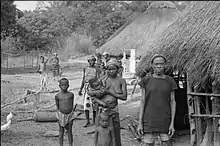Limba (peuple de Sierra Leone)
Les Limba sont une population d'Afrique de l'Ouest vivant principalement au nord de la Sierra Leone, où ils constituent le troisième groupe du pays[1], après les Temnés et les Mendés. Quelques communautés vivent également en Guinée. Ils sont répartis en plusieurs patriclans et organisés en chefferies.
Pour les articles homonymes, voir Limba.
Ne doit pas être confondu avec Limba (peuple du Cameroun).
Limba

Famille limba à Kamakumba en 1968
| Langues | langue du groupe Kwa |
|---|---|
| Religions | religion animiste à laquelle ils mêlent certains éléments de l'Islam |

Carte de répartition
Quelques personnalités d'origine limba
- Siaka Stevens, président de Sierra Leone de 1971 à 1985
- Joseph Saidu Momoh, président de Sierra Leone de 1985 à 1992
- Johnny Paul Koroma, chef d'État de Sierra Leone de à
Notes et références
Voir aussi
Bibliographie
- (en) Samura Bockarie et Heribert Hinzen (dir.), Limba stories and songs, People's Educational Association of Sierra Leone, Freetown, 1986, 37 p.
- (en) Prince Sorie Conteh, An introduction to the religion of the Limba of Sierra Leone, UNISA Press, Pretoria, 2007, 170 p. (ISBN 9781868884322)
- (en) Ruth H. Finnegan, The Limba of Sierra Leone with special reference to their folktales or oral literature, University of Oxford, 1963, 3 vol. (thèse)
- (en) Ruth H. Finnegan, Survey of the Limba people of northern Sierra Leone, Overseas Research Publications, n° 8, HMSO, Londres, 1965, 150 p.
- (en) Ruth H. Finnegan, Limba stories and story-telling, Clarendon Press, Oxford, 1967, 352 p.
- (en) Irene John, The ancestors in Limba traditional religion and the incorporation of ancestral beliefs into Christianity, University of Edinburgh, Edimbourg, 1993 (thèse).
- (en) David Moore-Sieray, Pre-colonial history of Tonko and its neighbours : a study in the nature of Soso-Limba relations in the nineteenth century, Fourah Bay College, University of Sierra Leone, 1983 (thèse)
Articles connexes
Liens externes
- (en) « Assessment for Limba in Sierra Leone » (Haut Commissariat des Nations unies pour les réfugiés, 2003)
- (en) « Chronology for Limba in Sierra Leone » (Haut Commissariat des Nations unies pour les réfugiés, 2010)
- Portail de l’anthropologie
- Portail de Sierra Leone
Cet article est issu de Wikipedia. Le texte est sous licence Creative Commons - Attribution - Partage dans les Mêmes. Des conditions supplémentaires peuvent s'appliquer aux fichiers multimédias.